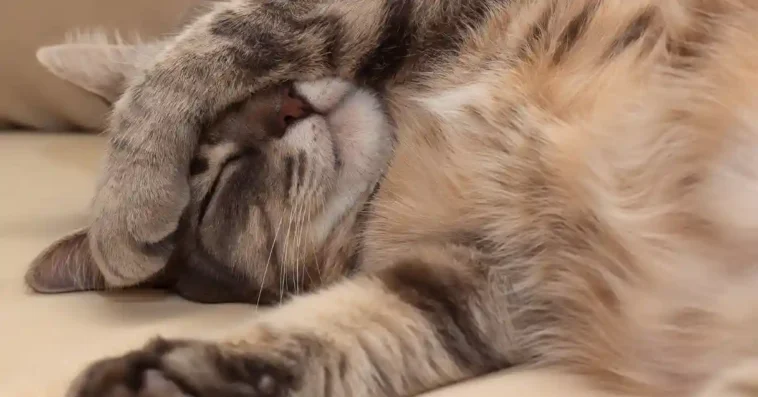Have you ever watched your cat sleep only to see his paw jerk or his whiskers flick like he’s chasing something in a dream? Maybe you’ve even seen him let out a tiny meow or kick his legs like he’s running. It’s kind of cute… and a little weird, right?
You might’ve asked, “Why does my cat twitch in his sleep?” Is he dreaming? Is he okay? Should I wake him?
You’re not alone. It’s one of those little mysteries many cat owners notice—but never quite know the answer to.
Let’s talk about it.
First Things First: Twitching in Sleep Is Usually Normal
Yes, really. Most of the time, when your cat twitches during sleep, it’s harmless.
Cats, just like us, go through different sleep cycles. REM sleep is one of those stages, short for rapid eye movement. That’s when the brain gets super active—even though the body stays relaxed primarily.
And guess what happens during REM sleep? Dreaming. Just like us.
Is My Cat Dreaming?
Chances are, yes.
When your cat twitches in his sleep, he’s probably deep in REM and dreaming away. Maybe he’s chasing a toy mouse, batting at a fly, or rolling in catnip heaven.
Ever seen your cat’s paws move like he’s running? Or hear a soft “mrrp” when he’s sound asleep? That’s the dream world in action.
It’s not just adorable—it’s a sign his brain is working well and processing things, just like a healthy, happy cat should.
Kittens Twitch More Than Adults
If you’ve got a kitten, the twitching might look more dramatic. Little legs kicking. Whiskers going wild. Whole-body flinches.
It can look intense, but it’s normal. Kittens are still growing, and their nervous systems are figuring things out. Their brain sends stronger signals during sleep, which makes those twitches more noticeable.
So don’t panic—it’s not a seizure, just a baby dreaming.
What If It’s Not a Dream?
Let’s break it down. Most sleep twitching comes from:
1. REM Sleep Activity
This is the most common reason. Legs, whiskers, tails, and even tiny vocal sounds are all part of dreaming.
2. Muscle Spasms
Sometimes, the twitching isn’t dream-related. Just a random muscle spasm. Like when your eyelid twitches for no reason. Cats get that, too.
3. Cold or Chilly Rooms
If it’s cold, your cat might shiver in his sleep. Try touching his ears or paws—if they feel too cold, add a blanket or move him to a warmer spot.
Okay, But When Should I Worry?
Most twitching is innocent. But if something feels off, trust your gut.
Here’s what’s not normal:
- Twitching while awake
- Jerky, stiff movements
- Drooling, foaming, or rigid limbs
- Waking up dazed or confused
- Losing balance after waking
These signs could mean something more serious, like a seizure. If you ever see anything like this, it’s time to call your vet.
But don’t let that scare you—most twitching is just your cat dreaming about zoomies.
Should I Wake Him?
Short answer? Probably not.
Waking a cat mid-dream might startle him. He could hiss, scratch, or leap in fear. Imagine someone shaking you awake amid a fantastic dream—annoying, right?
If he seems distressed, try calling his name softly. No need to poke or pick him up.
Let sleeping cats lie.
How to Help Your Cat Sleep Better
A good night’s sleep matters for cats, too. If you want your kitty to snooze peacefully (and maybe twitch a little less), here’s what you can do:
- Give him a warm, cozy bed
- Keep the room calm and quiet
- Play with him during the day so he’s ready to rest at night
- Avoid loud noises near his sleep spots
- Feed him on a schedule to help build a routine
Happy cats sleep deeply. And deep sleep = dreamy twitch time.
FAQs
Why is my cat twitching and meowing in his sleep?
He’s dreaming! It’s usually harmless and kind of sweet. He might be chasing bugs, playing, or having a kitty adventure.
My cat’s legs move like he’s running while he sleeps. Is that normal?
Yep. That’s a classic dream sign. If it’s gentle and he wakes up fine, there’s no reason to worry.
Could it be a seizure?
It might be if it’s violent, happens while awake, or is followed by confusion. But sleep twitching alone is usually normal.
Can I stop my cat from twitching?
You can’t stop it—and you shouldn’t. It’s part of natural sleep. Just make sure he’s comfy and well-rested.
Do older cats twitch less?
Sometimes. Older cats tend to sleep more but might dream less vividly. Still, every cat is different.
Final Thought From One Cat Lover to Another
If your cat twitches in his sleep, there’s a good chance he’s just off in his little dreamland—maybe hunting imaginary mice or reliving a fun play session.
It’s normal. It’s healthy. And honestly, it’s kind of beautiful.
So next time you see those tiny movements, don’t worry. Smile. Because it means your cat feels safe, loved, and comfortable enough to sleep deeply near you.
And if that isn’t the sweetest thing, I don’t know what is.





GIPHY App Key not set. Please check settings